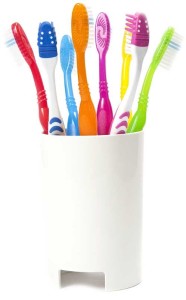How to Clean Up Your Oral Care Routine
Everybody should brush their teeth twice a day, right? It’s a common practice that was instilled in us as children. But do you know what’s REALLY in your toothpaste? For one, mass market tooth cleaning pastes usually contain sodium lauryl sulfate aka shampoo base. The main reason manufacturers add SLS to toothpaste is not to help make your pearly whites even whiter. It’s to make it easier to fill the tube at the factory and to make the product more consistent when being squeezed out. SLS is a good emulsifier, lubricant and foaming agent, but you might want to think twice before putting it in your mouth every day.
While commercial toothpaste may be amazing for combating tooth decay (that’s what they claim in their ads anyway), commercial products often offer little for the long term health of your gums. In fact, SLS actually dramatically increases skin and gum permeability. That means that if you have a bit of gum disease and brush every day with commercial toothpaste, there is a possibility that you will have gum disease issues for the rest of your life.
We began exploring alternative oral care formulas by first interviewing elders in their 80’s and 90’s about their oral care practices. We found more than one Vermonter with all (or nearly all) of their teeth in place who used table salt for dentifrice (toothpaste substitute). One woman told us she had started the practice during the Depression when they could not afford the price of commercial tooth care products. “It worked so well I just kept on going!” she told us. At 88 she still had a great set of (her own) teeth!
The thing is, table salt alone just does not whiten teeth and freshen breath effectively. So we went back to those interviews. By far the majority of non-toothpaste users swore by baking soda. None of those interviewed were aware of the potential for heavy metal contamination in some brands of baking soda; but all claimed good results. Note: There is a possibility of heavy metal contamination and even arsenic in some commonly sold baking sodas.
Vermont Soap uses laboratory quality sodium bicarbonate (baking soda) rather than risk exposing our customers to a potentially contaminated product. Tooth Salt is pre-mixed with sea salt and organic peppermint essential oil for added effectiveness. Neem Toothsalt adds the extra strength protection and breath freshening power of Neem leaves from India.
These three ingredients have withstood the test of time: sodium bicarbonate (baking soda), sodium chloride (table salt), and essential oils in small quantities and special herbs to kick it up.
Toothsalt is simple, safe, effective and economical.
You wouldn’t use the same hand towel month after month and never wash it; would you? Use the same sponge for a year without changing it? Wear the same underwear for months? Probably not. So why do most people settle for a simple rinse of their toothbrush in running water? It makes little sense to do this, watering germs just makes them grow faster! And remember the germs you are watering on your brush are the exact same germs you worked so hard to clean off your teeth and gums. Re-infecting yourself day after day with a grody toothbrush is just counterproductive to the cause.
The ideal cleaner for removing germs on your toothbrush is alcohol. Alcohol evaporates off the brush quickly leaving a clean fresh toothbrush behind. Get in the routine of cleaning your toothbrush after every use. Just spray it and forget it, or spray and rinse off after letting it sit for a full minute. May actually extend the life of your toothbrush.
For best practices we recommend washing brushes and other dental implements in Vermont Soap Organic Foaming Soap followed by a spritz of Organic Toothbrush Cleaner.
Play it safe! Never use chemically de-natured alcohol, rubbing or isopropyl, methylated spirits alcohol or standard cleaning chemicals to clean your dental implements.
So what are you waiting for? Clean up your oral care routine with Vermont Soap today!
*Dr. Bente Brokstad Herlofson Department of Oral Surgery and Oral Medicine University of Oslo, Norway
** Determination of Copper, Iron, Lead, Cadmium, Cobalt and Nickel by Atomic Absorption Spectrometry in Baking Powder and Baking Soda Samples after Pre-concentration and Separation Journal of Food and Drug Analysis, Vol. 10, No. 3, 2002, Pages 188-194


